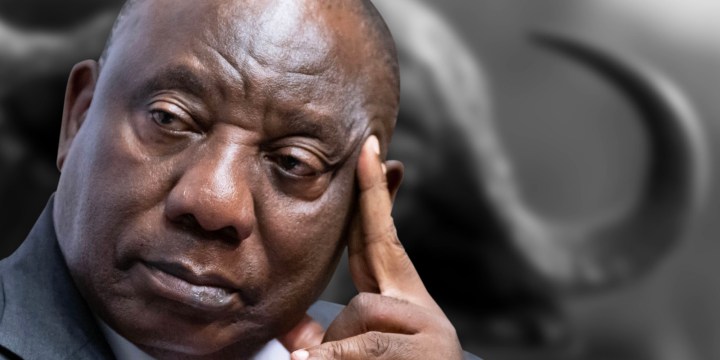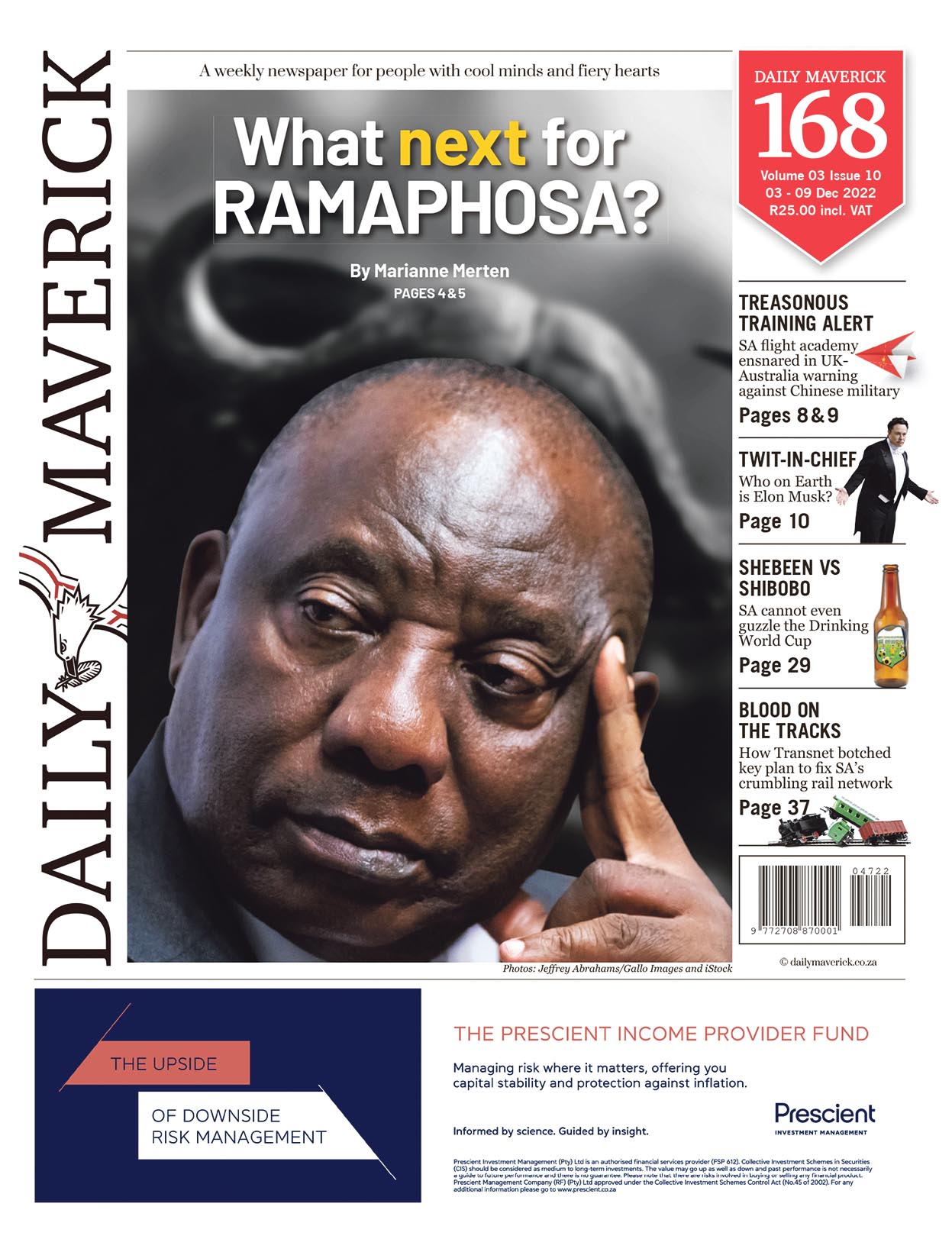PRESIDENTIAL IMPEACHMENT PROCEEDINGS
Phala Phala report – no good options for President Ramaphosa or our country

South Africa holds its breath as the ANC and alliance partners try to figure out what on earth to do about the recommendation to impeach President Cyril Ramaphosa. South Africa is now caught up in its third presidential game of musical chairs in 14 years.
President Cyril Ramaphosa and the governing ANC are in the dwang over the recommended presidential impeachment amid the fluid political and constitutional complications that reached into both Luthuli House and the Union Buildings. None of the options looked good, not for anyone. And certainly not for South Africa, now caught up in its third presidential game of musical chairs in 14 years.
On Thursday evening, Ramaphosa’s spokesperson, Vincent Magwenya, said the President was still consulting within the ANC, with the tripartite alliance and with other stakeholders, given the enormity of the matter.
“Whatever decision the President makes, that decision has to be informed by the best interest of the country. That decision cannot be rushed.”
Throughout the afternoon, speculation ran hot and heavy that Ramaphosa was being advised to legally challenge the impeachment recommendation to Parliament from the Section 89 independent assessment panel; that he was advised not to resign but rather use all wiggle room possible. Then Thursday evening’s ANC National Executive Committee (NEC) virtual meeting was delayed to the next day to allow it to be held in person.
The only certainty on Friday morning was that on Tuesday, 6 December, the National Assembly was scheduled to debate and vote on the Section 89 assessment panel’s recommendation of impeachment proceedings against Ramaphosa over serious violations of the Constitution. These included violations of Section 96, including paid outside work and exposure to conflicts of interest, alongside contravening the Prevention and Combating of Corrupt Activities Act.
Read more in Daily Maverick: “In the eye of the storm: Inside the report that might sink Cyril Ramaphosa“
A parliamentary debate would be followed by a vote – possibly by secret ballot or an open roll call – in a decision to be taken on the day.
The question for Tuesday’s vote will be whether MPs agree with the panel recommendation. If not, that’s the end of the matter. If yes, a parliamentary impeachment committee will start proceedings.
No other motions or steps are needed as such an impeachment committee is provided for by the rules of Parliament, and merely needs political parties to nominate its members, the National Assembly programming committee has been told.
That impeachment committee would ultimately have to make a decision after, among other things, public hearings that could include Ramaphosa as a witness. If it decided against removing the President, that would be the end of it. If it decided in favour of Ramaphosa’s impeachment, that decision would go to the National Assembly, where it would need a two-thirds majority to succeed. Though some of the President’s advisers may well have proposed he brazen it out, all this will go away if Ramaphosa resigns – and on Tuesday the House would have nothing to debate and vote on.
But also gone then would be any opportunity for him to re-establish his anticorruption, pro-Constitution credentials. And that may not be palatable to the politician who built his presidency on fighting corruption, achieving a social compact and kicking economic growth into higher, sustainable gear. Ramaphosa seems to have been caught off guard by the impeachment recommendation – possibly because of his side’s political spin for exoneration – and maintained he had done nothing wrong.
“I have endeavoured, throughout my tenure as President, not only to abide by my oath, but to set an example of respect for the Constitution, for its institutions, for due process and the law.”
This moment has been described as “unprecedented and extraordinary” in South Africa’s constitutional democracy.
Visit Daily Maverick’s home page for more news, analysis and investigations
It is a first – the parliamentary impeachment rules came into force only in November 2018 after the EFF went all the way to the Constitutional Court to get them in place.
But it’s not the first time the governing ANC finds itself in a presidential pickle. On 21 September 2008, and again on 15 February 2018, presidents Thabo Mbeki and Jacob Zuma, respectively, resigned after ANC NEC decisions amid bruising infighting.
Mbeki’s recall came amid the ANC machinations that had brought Zuma to party presidential power at the 2007 ANC Polokwane conference. In turn, Zuma resigned on pain of the ANC supporting an EFF motion of no confidence after the governing party’s patience with years of State Capture ran out.
Baleka Mbete, then the Speaker of the National Assembly, received both their resignations. Though the Constitution does not expressly speak of presidential resignations – Section 88 only talks of a presidential term ending “upon a vacancy” – telling Parliament is key because the National Assembly must, according to Section 86, elect a president from its ranks.
Four days after Mbeki resigned, MPs elected his party deputy, Kgalema Motlanthe, then Minister in the Presidency, as South Africa’s new President. He in turn appointed Mbete as his deputy president.
On 15 February 2018, the National Assembly elected Ramaphosa as President – less than eight weeks earlier, he had narrowly become ANC president at the Nasrec December 2017 conference. In a late-night announcement on 26 February, he appointed his party deputy president, David “DD” Mabuza, as Deputy President of the country.
If Ramaphosa is considering resigning, it would be an unprecedented self-initiated step, rather than a party recall.
And were Ramaphosa to resign, according to precedent it could bring his deputy into the President’s seat. But Mabuza has dropped in the ANC popularity stakes for a seat on the 80-strong ANC NEC, all the way down to 115 in the rankings with 210 votes, according to nominations released on Thursday.
Still, Mabuza may not become President, but acting president under Section 90 of the Constitution. That option had been on the table in February 2018, but was rejected to allow Ramaphosa to appoint his own Cabinet. In 2022, the circumstances are different, particularly if Ramaphosa also relinquishes his CR22 lead position in the ANC elective contest for the party presidency.
The permutations could be numerous – and complicated. The 2022 ANC Nasrec elective conference is just two weeks away, and Ramaphosa cannot be 100% certain of his support in the ANC NEC. Perhaps because of his narrow 2017 Nasrec conference win, it’s been mutable throughout his time at the helm of the governing party.
Though calls for Ramaphosa’s resignation have come fast and furious from the so-called Radical Economic Transformation grouping, the ANC NEC would in its deliberations from Friday have to consider the 2024 elections. And Ramaphosa remains the ANC’s voter drawcard.
He’s consistently been rated higher in public opinion and public trust polls than the party he leads. In the past two elections, including the 2021 municipal poll, it was Ramaphosa on ANC election posters in a strategic decision to appeal to voters.
As President, politicians and advisers hunkered down to consult, weigh up and do whatever necessary, South Africa’s tjatjarag politics maintained running commentary.
Turbulent times lie ahead. DM168
This story first appeared in our weekly Daily Maverick 168 newspaper, which is available countrywide for R25.




















 Become an Insider
Become an Insider
We do not have a Republic of Ramaphosa as the article seems to suggest. We have had one of the best Presidents the country has ever had, recalled by the people who are in charge and he resigned and heavens never fell. The same when the ANC recalled a constitutional delinquent called Zuma and we still have a country albeit in a very bad shape than when the Mbeki and Zuma left office. The SACC and the Anglican church do not see the problems you are seeing but a very irresponsible President. Bishop Makgoba has called for the establishment of a government of national unity. The SACC has called for the process of impeachment to unfold. If the ANC elects corrupt people in its leadership it is its jacket and the electorate has to respond to these criminals. The skokiaan polls that he is more popular than the ANC have only shown that in the last two elections he is less popular than Zuma in terms of results. In fact polls show that with him at the helm the ANC will less than 50 percent in 2024. To suggest that DD Mabuza whom the ANC elected as its Deputy is not fit for purpose is actually to say that the party that elected him is not fit for purpose.
There is no crisis but a contrived one to keep an incompetent President in office. What you see in the markets is very temporary as it happened when Mbeki was recalled, and a delinquent in Motlanthe installed who disbanded the Scorpions. Ramaphosa must answer as there are swirling social media reports about the origins of the money.
Is the purpose of government not to serve the SA people, rather than the party members? Only Nelson Mandela did this. Election results demonstrate public reaction to this failure. Ramaphosa stated publicly that he places ANC unity above the national interest, implying that this unity was/is in the national interest. Industrial scale corruption was/is the price of this unity.
Is O’Sullivan right about Rhoode and his relationship with Fraser? Hopefully the ongoing revelations and investigation will be exhaustive, Ramaphosa owes the nation a forthright explanation.
We also need a authoritative explanation of the distinction between sufficient, prima facie and hearsay evidence to the public, there seems to be confusion about these terms.
For a stickler regarding “procedures” Ramaphosa seems to be feeling pretty impetuous if the rumours regarding his possibly imminent resignation are to be believed.
It seems to me we could find a lot more time to allow us all to calm down if we let “procedures” take their course.
Professor Thuli Madonsela, our beloved previous Public Protector, appeared on TV to state that the panel’s decision had been made on hearsay, something unacceptable in a court of law. Nevertheless, any remaining Nats should give Fraser a medal, as he single-handedly destroyed the ANC, something the Nationalist party failed to do for 40(?) years!
The problem you seem you seem to have is to listen to tavern talk rather than first educate yourself on the legal basis and procedures of the Panel. Thuli Madonsela is talking absolute rubbish. The panel is not allowed to examine those who place what is evidence before it nor to call witnesses. It bases its decisions on the documents placed before it and the responses by the President that had huge gaps and still have. You need to educate yourself on prema facie and the garbage of sufficient evidence of Calland. Prema facie does not mean that a person is innocent or guilty but that there are question he needs to answer or clarify before an appropriate body. People get prosecuted on a prema facie basis by the NPA but some end up acquitted when the evidence is tested in court through examination of witnesses and their evidence. Criminal cases are decided on the basis of beyond reasonable doubt and civil case are decided on the notion of balance of probabilities. You must ask yourself why would the President have this difficulty in explaining a robbery in his farm and providing documentary proof as Angelo Fick asked? Can you not smell a rat if a person cannot explain a burglary and source of foreign currency and why after two and
half years the “buyer” has not collected his buffaloes?